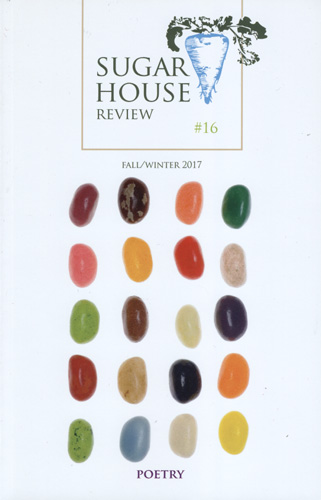Sugar House Review – Fall/Winter 2017
There is something unusual about Sugar House Review. With its glossy paper and curious formatting, this magazine not only stands out among others but also delivers aesthetic pleasure to its readers. The Fall/Winter 2017 issue features simple yet bold design which, I am sure, will charm anyone holding it in their hands. In addition to its appealing design, Sugar House Review offers a great number of pieces that will excite attentive readers. This issue features poetry, “sugar astrology,” and an interview with Kevin McLellan whose poems appear on the earlier pages of the issue. Always curious to know about a poet’s process, I was delighted to see the inclusion of an interview that asks all of the indispensable questions giving a sneak peak into Kevin McLellan’s creative process.
There is something unusual about Sugar House Review. With its glossy paper and curious formatting, this magazine not only stands out among others but also delivers aesthetic pleasure to its readers. The Fall/Winter 2017 issue features simple yet bold design which, I am sure, will charm anyone holding it in their hands. In addition to its appealing design, Sugar House Review offers a great number of pieces that will excite attentive readers. This issue features poetry, “sugar astrology,” and an interview with Kevin McLellan whose poems appear on the earlier pages of the issue. Always curious to know about a poet’s process, I was delighted to see the inclusion of an interview that asks all of the indispensable questions giving a sneak peak into Kevin McLellan’s creative process.
Delving into the poetry, I want to start with Andrea Jurjević’s “Fish Treatment.” The poem centers around Nona who lived through three wars but does not talk about them. What is startling about this poem is how it links what seems to be a trite act, cleaning and gutting a fish, with Nona’s sons:
The tap water rushed and tumbled
over the mackerel piled in the basin,
her hands holding the dead fishthe way she held her sons, one by one
each year of the Second War,before pulling a bed sheet over them,
And shutting their thin eyelids for good.
This heavy poem is striking not only in terms of its content but also in terms of sounds. To fully appreciate this poem, I decided to check out Sugar House Review’s handy feature “Sound of Sugar” which offers recordings of poets reading their works. Andrea Jurjević’s reading of “Fish Treatment” renders even more depth to the beauty of this piece.
Travelling through the pages of the issue, I stumbled on Kaja Weeks’s poem “Mouth Quill.” As a footnote conveys, the title refers to “Suude sulg—a singer’s magic tool in Estonian mythic lore.” Reading this poem, I thought of my professor’s definition of poetry: concentrated language striving to be music. In this case, I believe, the lines succeed:
From Northlands
winds blow low and rise, they ripen.
Metallic ringing runs from your mouth.
Wailing not at gods but from some crucible of the gods.
Your incantation pelts the room,
the color of blue sorrow.
One river, two rivers, three rivers, more.
Carefully placed alliteration, assonance, and other literary devices create a fascinating and aurally pleasing poem. After reading this piece, I decided to look up the author and found out that, in addition to being a creative writer, Kaja Weeks is a classically trained singer.
Kathleen Balma’s “Black Hole Horizon” explores the duality of fictional characters and nonfictional people. Can the two intersect? What are the chances? It appears that the speaker reveals their secrets to the audience:
I’m in flux with a TV alien, the best sad thing that’s happened to me all year. He’s in flux with someone else, of course. They live in different macrocosms. My chances with him aren’t great either, I know, but the odds of my nonfictional self bumping into his fictional one are actually much better than the odds of two universes overlapping and forming a handy little doorway, so I’m in a much better position than the long lost girlfriend.
The combination of simple sentences and complex compound sentences creates yet another dialectical tension within the lines. Carefully written, the poem not only guides its readers through the speaker’s story but also urges them to seek truth for themselves.
Written on the black background, Sugar House Review’s statement urges its readers to “Read. Subscribe. Pass Sugar House Review along,” and this is exactly what I am doing after thoroughly enjoying this fantastic issue.
[www.sugarhousereview.com]





